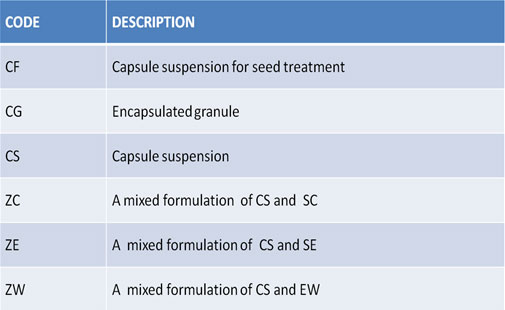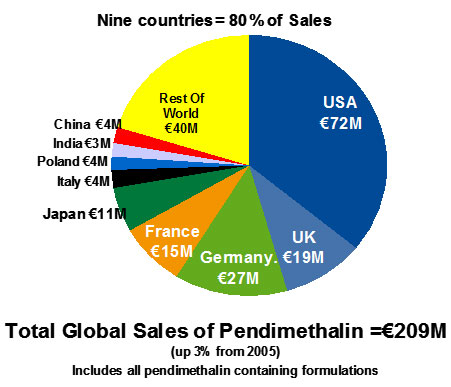 > r&d
> r&dCapsule Suspensions (CS)
In agrochemical sector, Microcapsules (MC) includes Capsule Suspensions( CS), Encapsulated Granule( CG), Capsule suspension for seed treatment (CF), etc.

However, the majority of current commercialized products are Capsule Suspensions with its international code CS, which is based on a polymer material as the capsule wall, by chemical, physical or physic-chemical methods, will serve as the heart sac agrochemical active substance wrapped together to form microcapsules having a semi-permeable membrane of the capsule, and they are stably dispersed and suspended with a certain concentration in water as the continuous phase.
Capsule suspension (CS) is the most environment-friendly formulation with the world's highest technical content and the best development prospects.
.jpg)
_01.jpg)
_02.jpg)
The biggest advantages of CS:
- Significantly reduced pesticide application costs. The consumption of technical materials is reduced by 1 / 3 to 1 / 2, moreover, 80% costs of emulsifiers and other additives are saved.
- Good prevention effect. The active ingredients in CS are concentrated in 30% -50% of the capsule core, where the efficacy can be controlled and sustained released. Besides, photolysis, hydrolysis and oxidation of pesticides are significantly reduced. Validity period of pesticides can be extended for 3-10 times.
- Adaptable to different acid and alkaline water.
- Greatly reduced the toxicity of pesticides for users and livestock.
- Minimized environmental pollution.
- This formulation makes it possible to compound pesticides of different pH values.
We have developed CS formulations for several insecticides such as lambda-cyhalothrin, chlorpyrifos, diazinon, lambda-cyhalothrin + chlorpyrifos, abamectin and fipronil.
In particular Pendimethalin 450 g/L CS, we have taken the lead in successful development of this pesticide in China after BASF.
Pendimethalin - the active ingredient
Pendimethalin has been used as an agricultural herbicide since the 1970’s, today it’s the world's third largest herbicide after glyphosate and paraquat and also the world's largest selective herbicide in terms of sales volume. It can be widely applied in cereals, soya beans, peanuts, cotton, rice, potato, tobacco, vegetables and other crop fields to control most annual grasses and many annual broad-leaved weeds such as barnyard grass, black-grass, crab grass, foxtail, daughter son, goose grass, pigweed, amaranth, velvetleaf, purslane, chickweed, black nightshade and so on.
Pendimethalin - Physical Properties
Formula:C13H19N3O4
Molecular weight :281.3
Melting point:54-580C
Vapor Pressure:1.94mPa(250C)
Physical state:Orange-yellow crystals,
Solubility:0.3mg/l (250C), soluble in organic solvent
Stability: stable to acids and alkalis, stable below 1300C, Slowly decomposed by light.
Pendimethalin is insoluble nature, combined with its vivid colouring has presented a challenge to formulation users. Until now, available formulations have relied on using solvents which have resulted in either free flowing liquids with a strong odour or more gloopy products which can settle out in storage. Both are prone to staining spraying equipment.
Pendimethalin also has a low melting point and is volatile in high-temperature illumination, so its lasting period will be affected. But if made into micro-capsule suspending agent, its bioactivity will be brought into better play.
So far, Pendimethalin 450g/l Micro-capsule suspending agent is the recognized variety with the highest technological content and the highest level of difficulty in the international circle of pesticide preparation.
Pendimethalin - available formulations
-EC formulations
These use solvents to dissolve the pendimethalin. The addition of an emulsifying agent allows the resulting concentrate to mix with water in the spray tank.
While EC formulations do pour well, they tend to produce a strong smelling spray.
-SC formulations
The insoluble pendimethalin is dissolved in a solvent which is then suspended in water. This solution is then ‘suspended’ in solution in the spray tank. The result is a product which has less smell but which can become gloopy during storage.
Problem: staining!
Staining is quite a big issue. While you can just about remove the stain using strong detergents, it’s a very laborious job.
In both EC and SC formulation types (above), the pendimethalin is freely available when added to water. As pendimethalin is a dye – it tends to stain all spraying equipment a vivid yellow and can create difficulties when cleaning empty cans for recycling.
Both EC and SC formulations tend to stain packaging and application equipment.
Pendimethalin - 450G/L Capsule suspension (CS)
Now using slow-release microcapsule technology, pendimethalin formulation comes into a new era.
In a CS formulation, the pendimethalin molecules are encapsulated in a polymer coating and suspended in water. The result is a solvent-free formulation without odour that pours well and is stable in storage.
Even better, as the pendimethalin is encased, it is not freely available in solution and so dramatically reduces equipment staining.
In addition with proper use, encapsulated pendimethalin has higher crop security and application flexibility.
450CS vs 400SC vs 330EC
|
|
Pendimethalin |
Pendimethalin |
Pendimethalin |
|
Handling |
★★★ |
★★ |
★ |
|
Staining |
★★★ |
★ |
★ |
|
Odour |
★★★ |
★★ |
★ |
|
Packaging |
★★★ |
★★★ |
★★ |
|
Pre-emergence efficacy |
★★★ |
★★★ |
★★★ |
|
Post-emergence efficacy |
★★★ |
★★★ |
★★★ |
|
Crop Safety |
★★★ |
★★★ |
★★ |
Pendimethalin 450G/L CS –Performance and Future
Farmers’ crops must continually compete for nutrients, space and sunlight against weeds. If left untreated, weeds can overwhelm crops and significantly reduce yield. Weed treatment is therefore critical for securing the farmers’ yields and profits. Pendimethalin 450G/L CS offers good efficacy on many weeds, few resistance problems and positive economic attributes.
Till now, pendimethalin 450G/L CS has been registered and widely used in most countries across five continents. From below tables we can see the sales volume of BASF in global market and the use of pendimethin 450g/L CS in different crops.

